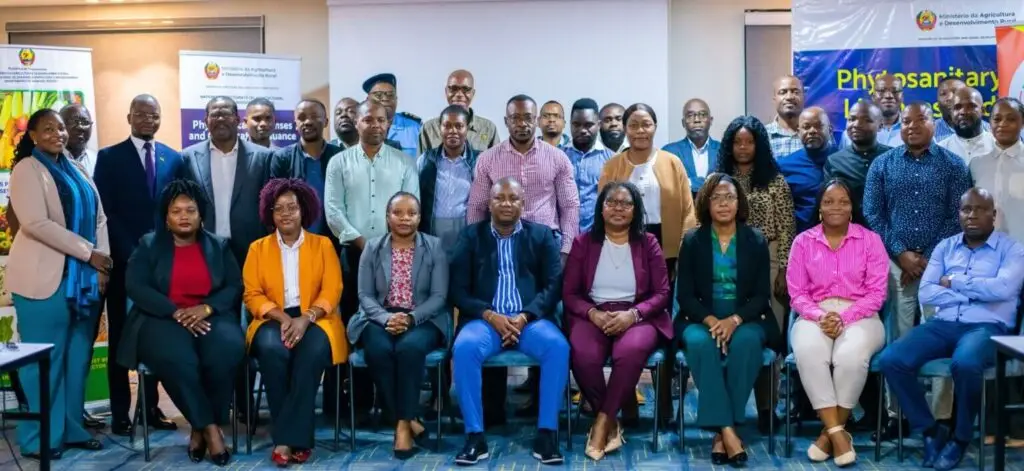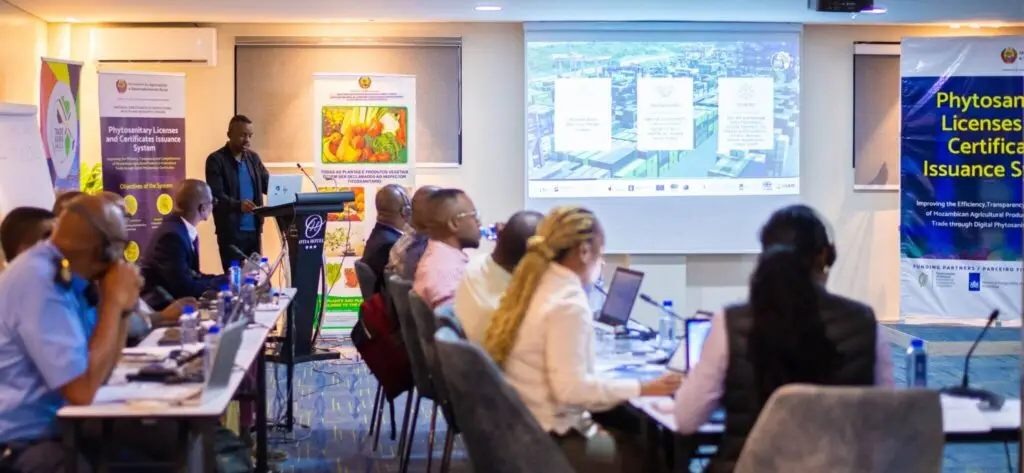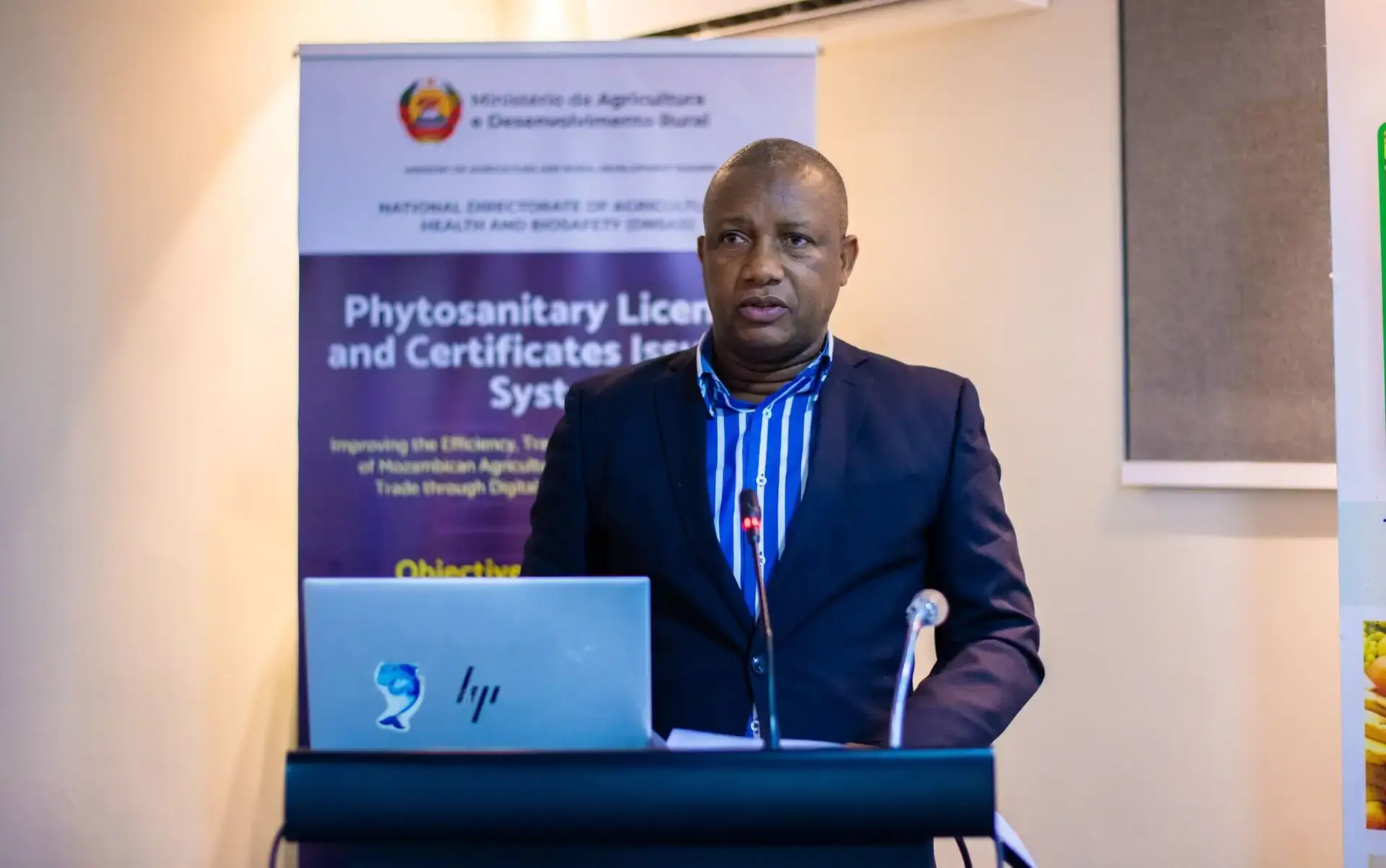Maputo, 13 August 2024: The Government of Mozambique, through the Ministry of Agriculture and Rural Development (MADER), in partnership with TradeMark Africa (TMA), has commenced sensitisation trainings and Phytosanitary Licenses and Certificates Issuance System review workshop for plant health technicians, government staff, importers, and exporters involved in the process of importing and exporting vegetables, plant products and sub-products, for subsequent implementation of the digitalized system platform. This platform was designed to significantly reduce the time and cost of processing Phytosanitary Licenses and Certificates.
The workshop is carried out by the National Directorate of Agricultural Health and Biosafety (DNSAB) at MADER, responsible for processing phytosanitary certification, in partnership with TradeMark Africa, a non-profit entity that supports countries in Africa to reduce the time and cost of trade through various trade facilitation initiatives.
Currently, the application processing and issuance of phytosanitary certificates are done manually. The process involves filling out and submitting physical forms for inspection, sampling and testing requests. Provincial-level phytosanitary inspectors then collect samples of plants or plant materials for laboratory analysis if required, and the results are recorded on physical forms that are submitted to phytosanitary inspectors at the DNSAB for review and approval. This process is time-consuming, expensive and subject to errors or administrative lapses.
“Applicants physically visiting one or many of the Authority’s certification offices in Maputo or at other stations across the country means that a lot of productive time is wasted on mundane tasks. This is not tenable if we are to improve the time and reduce the cost of doing business and position Mozambique as an attractive destination for investment,” says dr. Afonso Sitole, Head of the Phytosanitary Inspection and Plant Quarantine Department at MADER.

Typically, a lot of the applications include requests for certification for the export and re-export of products such as bananas, mangos, lychees, cashew nuts, seeds, seedlings, and biological control agents, and importation of other plant products. Traders or their authorised agents must visit DNSAB headquarters or any of its 61 SPS agencies across the country to submit the paperwork and make numerous follow-ups on the status of their submissions before a request is granted or rejected. Applicants also have to visit a physical bank branch to pay the requisite fees.
Other than the high logistics costs due to physical movements, there’s opportunity cost lost in business dealings or transactions. To improve efficiency, reduce time and cost, and enhance State revenues, MADER, with support from the Governments of Ireland and The Netherlands through TMA, is digitalising the SPS certification process. The new system will provide an end-to-end paperless mechanism for applicants and inspectors, covering application submission, evaluation, inspection, online payment, approval and issuance of the SPS licenses and certificates.
The workshop sessions will focus on presenting the trial version (prototype) of the system to participants, by taking them through the export, import, re-export, and transit processes, from registration to acquisition of the Phytosanitary certificates, as well as obtaining user feedback on the system’s improvement. This will enhance their familiarity with the protocols of the upcoming system, secure their buy-in, and address any initial issues before full operationalisation.
“This will be a game-changer for all actors in the industry. Once the system is fully operational, the process will be as simple as lodging an application request in the system, paying the necessary fees, and making the required follow-ups from the comfort of their homes or offices. The system will streamline the administrative process, allow proper analysis for ease of decision-making, thereby injecting efficiency into the entire process,” said Mr. Carlos Bulo, Agricultural Engineer at FRUTISUL.
This automation initiative is part of TMA’s broader approach to enhance trade facilitation in Africa by leveraging digital solutions at government and private sector agencies for seamless trade. “We are delighted about the potential that this digital system has in transforming the way SPS certificates are processed. This workshop, and many more to come, is not only timely but also a significant step towards improving efficiencies and reducing costs for traders, in turn providing the much-needed impetus to the economy,” remarked Jovin Mwemezi, Director, Southern Africa at TradeMark Africa.

The system will be integrated with the Electronic Single Window system for information exchange on phytosanitary certificate issuance or replacement, as well as import and export authorisation. There are also plans to integrate it with the International Plant Protection Convention (IPPC) e-Phyto hub for sharing the issued certificates with counterpart agencies in destination markets as well as receiving certificates for import consignments.
About the National Directorate of Agricultural Health and Biosafety
The National Directorate of Agrarian Health and Biosafety (DNSAB) is the Directorate of the Ministry of Agriculture and Rural Development (MADER) responsible for ensuring the country’s sanitary and phytosanitary defence, through border and internal control, ensuring the prevention of the introduction and/or spread of pests, exotic diseases, animal diseases, in the import and/or internal circulation of plant products and by-products. and animals as well as ensuring supervision/inspection and certification of exports, licensing imports, of plant and animal products and sub-products.
DNSAB is headquartered in the MADER building, Lusaka Agreement avenue, Mozambican’s Heroes Square in Maputo, has as one of its powers the issuing of Phytosanitary Licenses and Certificates for the import, export and re-export of various agricultural products in Mozambique. For more information please visit the website: www.agricultura.gov.mz
DNSAB operates through Phytosanitary Inspection Posts (PIFS), Provincial Services of Economic Activities and Provincial Directorates of Agriculture and Fisheries, spread across all provinces, totalling 61 phytosanitary posts including entry and exit points of the country, on which 12 issue Phytosanitary Certificates and Licenses.


